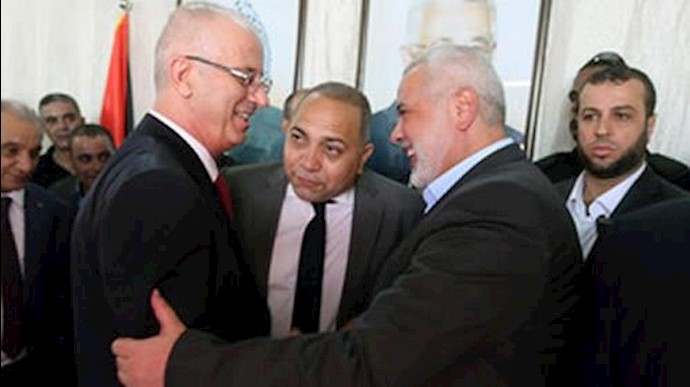by Hamid Bahrami
Al Arabiya, 11 October 2017 – After years of schism, the Palestinian groups, Fatah and Hamas decided to end the bloody split. Rami Hamdallah, the Palestinian Prime Minister warmly shook hands with Hamas leader Ismail Haniya in Gaza Strip.
Conflicts between known Palestinian groups is one of the main reasons to not achieve peace for the long bloody Israeli-Palestinian conflict.
It is public knowledge that the Iranian regime is fomenting these conflicts by consistently drive a wedge between various Palestinian groups. Adding fuel to the fire through funding and arming Hamas have been one of Tehran’s tactics.
For those who are familiar with Iranian regime’s policy about the Palestinian crisis, it is bitterly understandable why the regime foments these conflicts. Since 1979 revolution in Iran which overthrew Israel’s sole ally in the Middle East, the Islamic regime found anti-Israeli slogans as an ideological lever to persuade public opinion in both inside and outside of Iran in order to facilitate the export of its “Islamic revolution” to its neighbors.
Tehran and its terrorist arm
In fact, a peaceful solution to the Israeli-Palestinian conflict will effectively disarm Iran’s ruling theocracy. Unfortunately, the mullahs have achieved these goals for more than 30 years.
However, one should not disregard the fact that international policies, specifically the Arab allies’ indifferent negligence and the failed policy of appeasement provided Tehran and its terrorist arm, the Islamic Revolutionary Guard Corps (IRGC) a golden opportunity to intensify the conflict.
In recent years, due to IRGC’s crimes in support of Syrian dictator Bashar al-Assad, Hamas finally Fatahoms what Fatah has said for many years.
Furthermore, increased political and economic pressure and the Palestinians public demand put Hamas in an irreversible position. Hence, Hamas unveiled a new policy platform, which distances it from IRGC’s goals to destroy Israel.
As a result of Egypt’s mediation between Palestinian groups, they have now begun to solve their marked conflicts.
The different sides involved including Israel, the Arab allies and the US all play specific roles in their favor’s.
As history reveals, the Iranian regime will not just give up to lose its lever despite having failed ideologically and legitimately in both inside and outside of the country.
Considering that the split between Palestinians secures the regime’s regional interests, Shi’ite clerics will no doubt kindle a new fire between Palestinians.
The Palestinian Prime Minister leading a unity cabinet in Gaza signals the beginning of reconciliation talks that are of historic proportion.
In this regard, the UN Middle East envoy, Nickolay Mladenov, highlighted an important issue as he said: “If the region stays engaged, if Egypt’s role continues and if the political parties themselves continue to show the willingness they are currently showing to work with us on this process, then it can succeed.”
Apparently, Hamas is concerned about a likely failure of its talks with Fatah. The words of its deputy chief is enough to see these concerns.
“Bartering or touching the weapons”, said Khalil al-Hayat as he drew a red line for the negotiating sides. Although, his words bring a feeling of disappointment, but if the Iranian regime is restricted to arm and fund Hamas, the Islamic group will eventually be disarmed.
Israel’s contradictory signals
One of the most effective points to a smooth transition to permanent peace is Israel’s understanding of the reality on the ground.
Stopping the settlements in the West Bank and accepting the two state solution by Israel will strengthen Fatah’s position in negotiations with Hamas.
In this case, the US should persuade Israel to recognize the 1967 borders.
On the other hand, it is crucial that Egypt and its Arab allies push the Gaza residents toward Fatah’s goals.

Hamid Bahrami is a former political prisoner from Iran. Living in Glasgow, Scotland, he is a human rights and political activist, and works as a freelance journalist. Bahrami has contributed to Al Arabiya English and American Thinker as his work cover’s Iran’s Middle East actions and domestic social crackdown. He tweets at @HaBahrami and blog at analyzecom.wordpress.com








